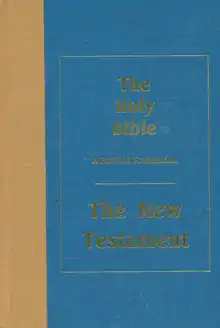The Holy Bible: A Purified Translation
The Holy Bible: A Purified Translation is an edition of the New Testament which was published in 2000. A year earlier, 40,000 copies of the Gospel of John from this translation had been mailed to Southern Baptist pastors.[1] It was translated by Stephen Mills Reynolds, and published by the Lorine L. Reynolds Foundation as a memorial to his wife. Reynolds (a graduate of Miami University, Princeton Theological Seminary, Princeton University, and Columbia University)[1] previously served on the translation committee of the New International Version.

The preface explains that in contrast to many modern English Bible translations it has "been purified of errors that have misled people, in some cases for centuries" (p. vii). The main issue that has been addressed in this "purification" is the drinking of alcohol by Christians, the translator believing that Christians should be teetotalers.
"Dr. Reynolds goes to extraordinary lengths to support his convictions regarding the use of alcohol."[2] Reynolds explained some of his translation decisions in Journal of Ethics and Bible Translation 1.1 (1995).
The translation has had mixed reviews,[3] with some focused on the matter of translating oinos, the Greek word that is traditionally translated "wine".[4]
The condemnation of alcohol consumption, and addressing texts that have been used to support it, begins in the Preface (p. iv), where the translator explains his view that Micah 2:11 has been previously mistranslated in a way that allows for the moderate consumption of alcohol. The matter of alcohol is also addressed by footnotes not only in passages that are traditionally translated with "wine", but also on notes for passages such as Romans 1:17 "the just shall live by faith" (a verse usually associated with the doctrine of Sola fide rather than ethics of drinking wine), Romans 14:2,10, 1 Corinthians 11:25, 2 Timothy 2:15, Rev. 20:2.
The book contains notes on the translator's translations of Micah 2:11 and Proverbs 23:31. It was reported in June 1999 that there was a plan to finish the entire Bible by 2004,[5] but that did not happen.
The translation does not use "thee" and "thou," but uses "you" followed by a grave accent to indicate the use of singular you (i.e. "you`"); a normal "you" is used to indicate the plural form.[6]
References
- Paul, William (2003). English Language Bible Translators. Jefferson, NC: McFarland. p. 194.
- "The New Testament: A Purified Translation". www.biblecollectors.org. Retrieved 2020-03-20.
- A review of a Purified Translation. pp. 445-454, Charles P. Pierce. 2009. The Time of Christ's Return Revealed - Revised Edition: Multiple Models Confirm the Time Given to Daniel. Author House.
- "The "Purified Version" is A Blaspheme of God's Word". bibleteacher.org. Archived from the original on 2010-11-20.
- Baptist Press, "Bible Translation Developments in 1999". Archived from the original on 2013-08-02. Retrieved 2013-07-20.
- "The Gospel According to Matthew". The Holy Bible: A Purified Translation. 2000. Archived from the original on 2009-03-07. Retrieved 2020-03-20 – via The L. L. REYNOLDS FOUNDATION.
9. A (`) in this translation indicates the second person singular. The plural remains unmarked. In this way, the distinction of second person forms will be preserved while the archaic 'thou,' etc. is abandoned.